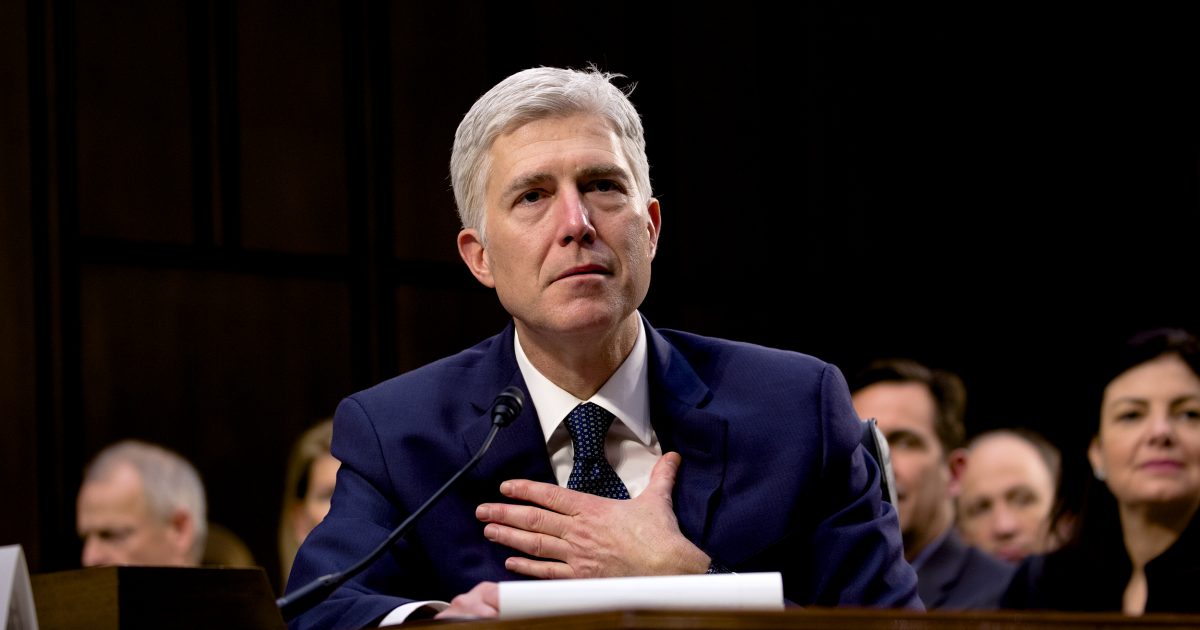
Two recent decisions issued by Supreme Court Justice Neil Gorsuch show why he was a favorite of civil liberties’ activists before he was appointed to the bench.
ANOTHER 5–4 decision with Gorsuch joining the liberals, this time ruling that a law permitting judges to extend the length of certain sentences—without a jury finding facts first—violates the 5th and 6th Amendments. A good decision! https://t.co/pdTQPAo0LI pic.twitter.com/a5YGtkzb89
— Mark Joseph Stern (@mjs_DC) June 26, 2019
#BREAKING: Gorsuch sides with liberal justices in finding federal gun law to be "vague" https://t.co/m8EWQCOiaY pic.twitter.com/oozHlo7LHH
— The Hill (@thehill) June 24, 2019
In both cases, Gorsuch sided with liberal justices on the nation’s highest court to curtail abuses related to due process which encourage imprisonment and lengthy prison sentences.
“In our constitutional order, a vague law is no law at all,” Gorsuch wrote of a ruling that invalidated certain mandatory minimum penalties. “Only the people’s elected representatives in Congress have the power to write new federal criminal laws. And when Congress exercises that power, it has to write statutes that given ordinary people fair warning about what the law demands of them.”
Maurice Davis and Andre Glover, two men convicted of felony robbery charges, were also charged and convicted under a federal statue of a “crime of violence.”
These type of vague laws, which serve to fuel the prison-industrial complex by tacking on additional superfluous charges for defendants, are no longer valid thanks to Gorsuch’s decision.
Another decision is even more controversial, pertaining to convicted child sex offender and the right to stand trial before a jury.
“Only a jury, acting on proof beyond a reasonable doubt, may take a person’s liberty,” Gorsuch wrote of a law denying a defendant’s right to due process. “That promise stands as one of the Constitution’s most vital protections against arbitrary government.”
The case pertained to Andre Haymond, a man sentenced to prison for 38 months with a supervised release of 10 years after being found guilty of possessing child pornography.
Haymond claimed it was unconstitutional that he would be sent back to prison for at least five years if he was found guilty by a judge based on the preponderance of the evidence for an alleged subsequent offense while on supervised release.
Because of Gorsuch’s decision, Hammond and other defendants like him would have to receive a jury trial before being sentenced after allegedly re-offending.
“A judge’s authority to issue a sentence derives from, and is limited by, the jury’s factual findings of criminal conduct,” Gorsuch wrote. His pro-civil liberties stances were opposed by the more conservative judges on the Supreme Court who felt that Gorsuch is going too easy on law-breakers.
“Supervised-release revocation proceedings are not part of the defendant’s criminal prosecution … It follows, then, that ‘the revocation of [supervised release] is not part of a criminal prosecution,'” Justice Samuel Alito wrote.
“As this court has explained multiple times, criminal laws that apply a risk standards to a defendant’s conduct are not too vague, but instead are perfectly constitutional,” Justice Brett Kavanaugh wrote.
Gorsuch is not afraid to rule with liberal justices if he feels it bolsters the Constitution. Although his opponents may ride him for being weak on crime, Gorsuch is clearly a friend of the Bill of Rights, keeping the core liberties enshrined by the Founding Fathers in mind when making his rulings on the bench.



